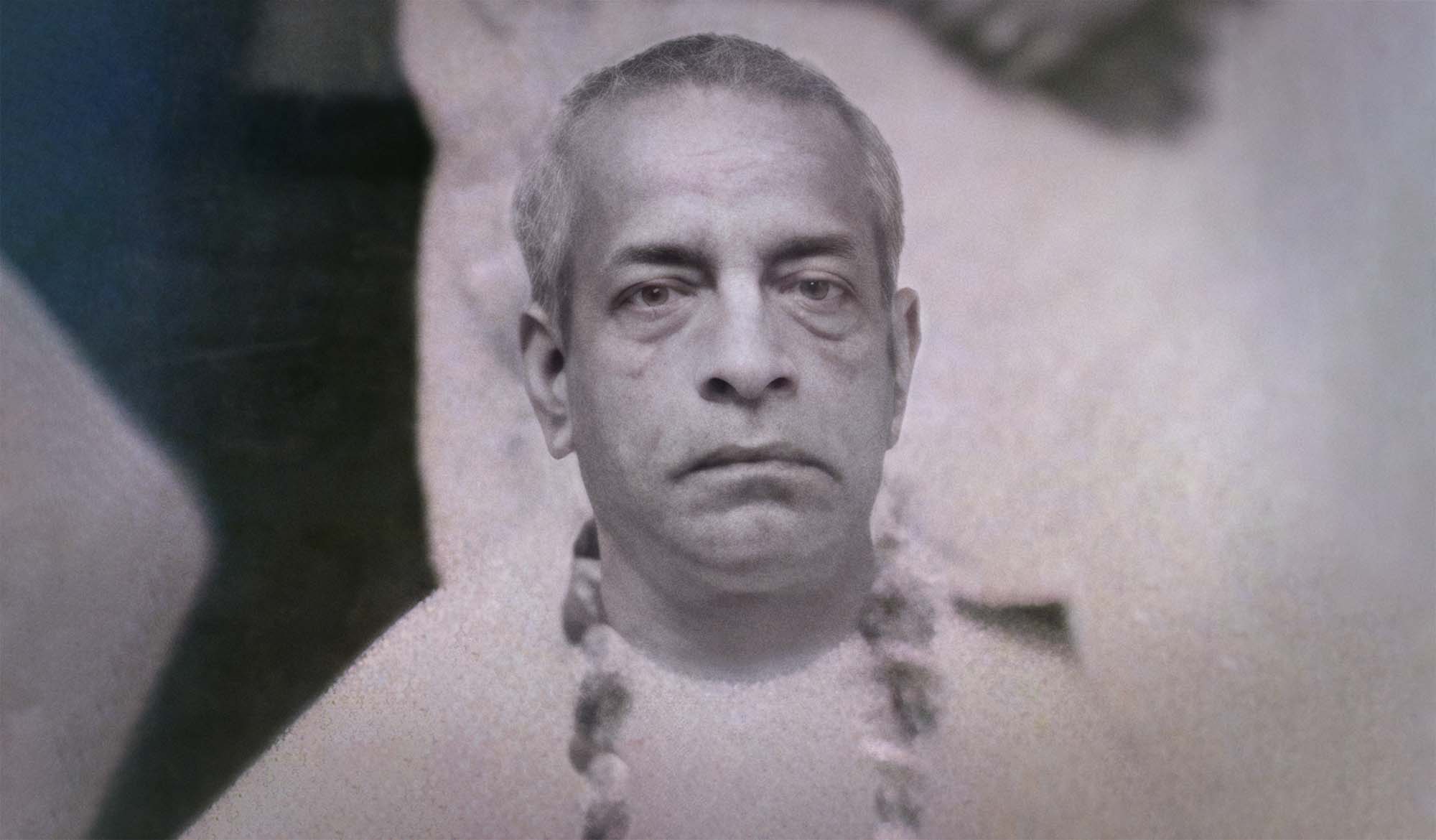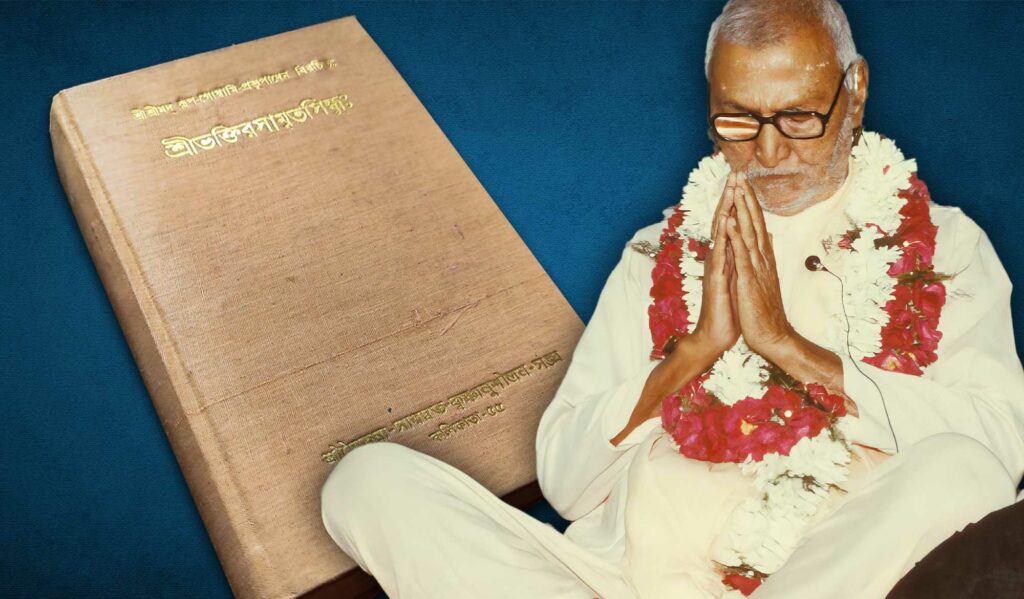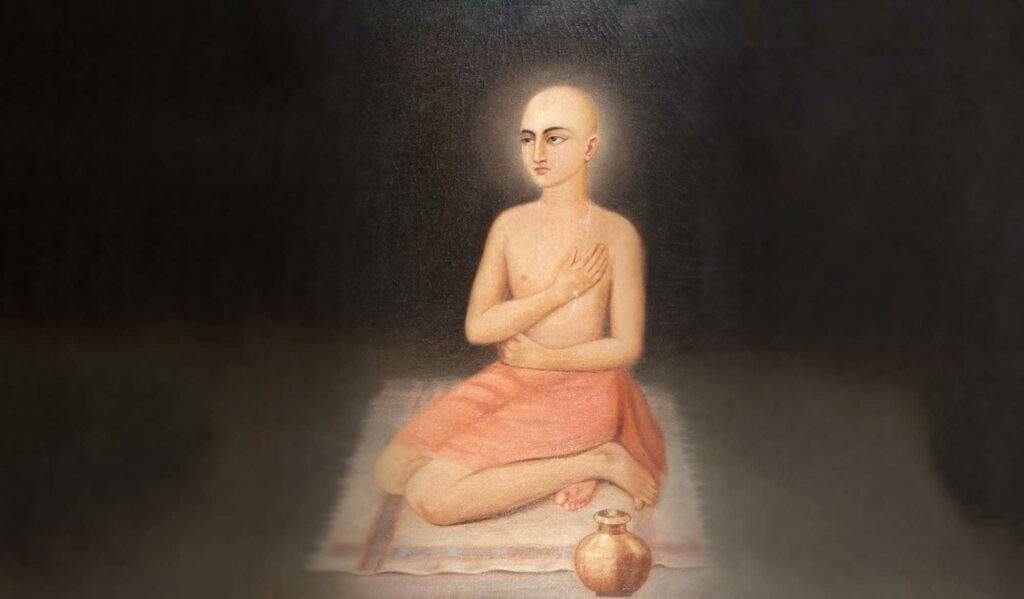Overview
This article by Śrīla A.C. Bhaktivedānta Swami Prabhupāda was first published in Śrī Gauḍīya Patrikā, 5th Volume, Issue 2, on 13th April 1953. Śrīla Prabhupāda writes a letter to a gentleman who has printed two books “full of apa-siddhānta” and points out their philosophical flaws in relation to a well-known 'sādhu'. This article was translated from Bengali by Swami B.V. Giri and Sanātana Dāsa.
The head of the Hari-bhakti-pradāyinī Sabhā (the assembly for ‘preaching’ devotion to Hari), in Calcutta has compiled and distributed two books called Upadeśāmṛta and Amṛta-utsa which are full of apa-siddhānta (false philosophical conclusions). A close friend of mine sent me those books as a gift. A letter reviewing these two books was sent to the author, but no reply was received. That is why I have published the letter in Śrī Gauḍīya-Patrikā for the information of the public. The correspondence is as follows:
…I had the great pleasure of receiving the aforementioned two books compiled and published by you through my childhood friend and elder brother, Karttik Dādā (Śrī Karttik Chandra Mullick, B.Sc, B.L, Attorney). I think, some time ago, I went to your Hari Sabhā with my close friend, Śrīmān Narendranath Mullik. Seeing your enthusiasm and efforts in preaching hari-bhakti and especially reading the prayers you have written in the book Amṛta–utsa, I consider you to be a great devotee and like a family member. I have extracted a section of prayers from there as follows:
śītala caraṇe sthāna dui nija guṇe
lainu śaraṇa ebe u’rāṅgā caraṇe
adhama balāi kahe karuṇā nidāna
śrī-rādhā-govinda bali yāya yena prāṇa
Give me shelter at Your cool feet by Your own qualities.
I take shelter now at those reddish feet.
The fallen Balāi says, “O bestower of mercy,
Let me give up my life chanting ‘Śrī Rādhā-Govinda.’”
Anyway, considering you as a kind of relative, I have taken the courage to say one or two things. I hope you will be happy to provide an appropriate response.
Needless to say, as busy as we are trying to take shelter at Śrī Govinda’s feet, Śrī Govinda Himself is a hundred thousand times busier trying to place us at His feet. He has come in His own form and has sent His own men to give us a place at His feet, and He has been defeated yuga after yuga! Therefore, if we actually take shelter of the feet of Śrī Govinda, then why do we need to worry? Bhagavān Śrī Govinda, Śrī Kṛṣṇa gave His final instructions in the Bhagavad-gītā as follows:
(1)
sarva-dharmān parityajya mām ekaṁ śaraṇaṁ vraja
ahaṁ tvāṁ sarva-pāpebhyo mokṣayiṣyāmi mā śucaḥ
(Abandon all varieties of religion and just surrender unto Me. I shall deliver you from all sinful reaction. Do not fear. – Bhagavad-gītā 18.66)
(2)
man-manā bhava mad-bhakto mad-yājī māṁ namaskuru
mām evaiṣyasi satyaṁ te pratijāne priyo’si me
(Always think of Me and become My devotee. Worship Me and offer your homage unto Me. Thus you will come to Me without fail. I promise you this because you are My very dear friend. – Bhagavad-gītā 18.65)
(3)
mattaḥ parataraṁ nānyat kiñcid asti dhanañ-jaya
mayi sarvam idaṁ protaṁ sūtre maṇi-gaṇā iva
(O conqueror of wealth, there is no truth superior to Me. Everything rests upon Me, as pearls are strung on a thread. – Bhagavad-gītā 7.7)
(4)
mām eva ye prapadyante māyām etāṁ taranti te
(Those who have surrendered unto Me can easily cross beyond that material nature. – Bhagavad-gītā 7.14)
(5)
na māṁ duṣkṛtino mūḍhāḥ prapadyante narādhamāḥ
māyayāpahṛta-jñānā āsuraṁ bhāvam āśritāḥ
(Those miscreants who are grossly foolish, lowest among mankind, whose knowledge is stolen by illusion, and who partake of the atheistic nature of demons do not surrender unto Me. – Bhagavad-gītā 7.15)
But we are unfortunate persons – avajānanti māṁ mūḍhā mānuṣīṁ tanum āśritam (‘Fools deride Me when I descend in the human form.’ – Bhagavad-gītā 9.11). Due to this consideration and our misdeeds birth after birth, thinking Śrī Govinda to be an ordinary man, and by comparing the jīva’s bodies, which are fit to be eaten by jackals and dogs, with Śrī Govinda, we began to cast our vote! Instead of worshiping the tattva-darśī-ācārya (the guru who has seen the truth) as per the instruction of the Lord, I have taken shelter of heroic fruitive workers, heroic scholars, those who have many material desires, impersonalists, those who try to harmonise spirituality with mundane life, those who believe there are many gods, those who are envious of the Lord, and mental speculators. This is why Śrīman Mahāprabhu Gaurasundara as anarpita-carīṁ cirāt karuṇayāvatīrṇaḥ kalau (‘mercifully descending in the age of Kali to give that which was never given before’) came to bestow vairāgya-vidyā (knowledge of true renunciation). And in order to inspire kṛṣṇa-prema in the jīvas, He Himself tasted kṛṣṇa-prema and showed them the way to take shelter at Śrī Govinda’s feet. Jīvera svarūpa haya kṛṣṇera nitya dāsa (‘It is the living entity’s constitutional position to be an eternal servant of Kṛṣṇa.’ – Caitanya-caritāmṛta, Madhya-līlā 20.108) – by propagating this teaching, He established His great magnanimity (mahā-vadānya). The former minister of Nawab Hussein Shah, the wise and learned Śrīla Rūpa Gosvāmī Prabhupāda addressed Him thus:
namo mahā-vadānyāya kṛṣṇa-prema-pradāya te
kṛṣṇāya kṛṣṇa-caitanya-nāmne gaura-tviṣe namaḥ
(O most munificent incarnation! You are Kṛṣṇa Himself appearing as Śrī Kṛṣṇa Caitanya Mahāprabhu. You have assumed the golden color of Śrīmatī Rādhārāṇī, and You are widely distributing pure love of Kṛṣṇa. We offer our respectful obeisances unto You.)
Saying this, he bowed down to Him.
But in spite of this, our jñāna-cakṣu (eye of divine knowledge) has not revealed anything to us. Can you say what is the reason? The reason is our misfortune and asat-saṅga (bad association). Śrī Caitanya Mahāprabhu taught this – what is the duty of a Vaiṣṇava who has surrendered at the lotus-feet of Govinda? In the text of Śrī Caitanya-caritāmṛta we find:
asat saṅga tyāga ei vaiṣṇava ācāra
strī-saṅgi eka asādhu kṛṣṇābhakta āra
(A Vaiṣṇava should always avoid the association of ordinary people. Common people are very much materially attached, especially to women. Vaiṣṇavas should also avoid the company of those who are not devotees of Lord Kṛṣṇa. – Caitanya-caritāmṛta, Madhya-līlā 22.87)
Unfortunately for us, these two types of asat-saṅga occur, and therefore, even though we pretend to take refuge in Śrī Govinda, we are unable to see the moonbeams emanating from the toenails of His feet. The word strī means māyā. Therefore those who are floundering in the mirage of māyā, incessantly eating, who are attached to mundane work, attached to dry knowledge and who have many material desires, become unsatisfied with the enjoyment of this world and, like a jackal in a vineyard dressed in the garb of a renunciant, they proclaim, “The grapes are sour!” But then they return to the vineyard and shout, “These are my vines, my garden, my tree, my plot etc.” Śrīmad Bhāgavata has described the plight of such impure-minded people as follows:
ye ‘nye ‘ravindākṣa vimukta-māninas
tvayy asta-bhāvād aviśuddha-buddhayaḥ
āruhya kṛcchreṇa paraṁ padaḥ tataḥ
patanty adho’nādṛta-yuṣmad-aṅghrayaḥ
(Persons who are falsely under the impression of being liberated, without devotional service to the Lord, may reach the goal of the brahma-jyoti, but because of their impure consciousness and for want of shelter in the Vaikuṇṭhalokas, such so-called liberated persons again fall down into material existence. – Śrīmad Bhāgavatam 10.2.32)
Because the intellect of these māyāvādīs, who think they are liberated, is impure, they can never take shelter of the lotus feet of Kṛṣṇa. In relation to all these unfortunate people, the Lord Himself says in the Bhagavad-gītā:
moghāśā mogha-karmāṇo mogha-jñānā vicetasaḥ
rākṣasīm āsurīṁ caiva prakṛtiṁ mohinīṁ śritāḥ
(Those who are thus bewildered are attracted by demonic and atheistic views. In that deluded condition, their hopes for liberation, their fruitive activities, and their culture of knowledge are all defeated. – Bhagavad-gītā 9.12)
Seeing the diversity in material nature, or daivi-māyā, we sometimes attempt to become material enjoyers, and sometimes a rākṣasī (she-demon) in the dress of renunciant and demoniac-minded people call out to us in various ways and separate us from the lotus feet of Śrī Govinda.
Seeing this kind of lifeless effort in your book Amṛta-utsa, and considering you as an elder relative, we should warn you herein that the ‘sādhu’ whom from the very outset you have given attention to cannot be designated by the word ‘sādhu’ merely because of your collected writings.
In the final question and answer found in Śaṅkarācārya’s Maṇi-ratna-mālā Praśnottara that you have published, it is written:
Question: Who can be called a sādhu?
Answer: He who is free from attachment for all things, who is devoid of illusion and fixed in Brahman – he is a sādhu.
But that person who left saṁsāra, and wore red cloth like a mendicant, fell into the rubbish of a bigger saṁsāra and made an attempt to ‘improve’ it.
“Forget not that your society is but a shadow of mahāmāya! The low born, the foolish, the destitute, the ignorant, the cobblers, the sweepers – these Indians are my brothers! The ignorant Indian, the poor and destitute Indian, the brāhmaṇa Indian, the caṇḍāla Indian – they are my brothers! The Indian is my life! The gods and goddesses of India are my God! Indian society is the cradle of my infancy, the forest of my youth. Say it, brother! ‘The soil of India is heaven to me!’”
Should we offer obeisances to the person who is shouting these words so loudly that his voice cracks? Is he free from attachment, or has he attained knowledge of the Supreme? Kindly give me a response to this.
In the Bhagavad-gītā, in the section concerning jñāna, Bhagavān Śrī Kṛṣṇa instructs, asaktir anabhiṣvaṅgaḥ putra-dāra-gṛhādiṣu (‘freedom from entanglement with children, wife, home etc’). Therefore, one who is attached to the body, sons, friends, wife, country, society etc. – is he knowledgable or not? Is he free from material attachments or not?
brahma-bhūtaḥ prasannātmā na śocati na kāṅkṣati
samaḥ sarveṣu bhūteṣu mad-bhaktiṁ labhate parām
(One who is thus transcendentally situated at once realises the Supreme Brahman and becomes fully joyful. He never laments or desires to have anything; he is equally disposed to every living entity. In that state he attains pure devotional service unto Me. – Bhagavad-gītā 18.54)
He who is brahma-bhūta (situated in the Absolute) or brahma–niṣṭhā (fixed in the Absolute), will be sama–darśana (possessing equal vision). Why does he cry a river and create a flood of tears from his eyes for the human species who are residents of India, while destroying the residents of India who belong to the goat species? Why does he only endeavour to make the muscles of the body of humans who are residents of India as strong as iron and as permanent as steel? If he is making such an effort, then he does not possess the knowledge of a sama-darśana (being equally disposed to all living beings) or samaḥ sarveṣu bhūteṣu (in the state of brahma-bhūta). What other way is there to say this? If he is brahma-bhūta or brahma–niṣṭhā, please let me know how he can be called as such.
Without referring to any other evidence, all the proof you have gathered yourself demonstrates that the person whose photo you have used in your book can never be defined as a sādhu. He may be a karmī, he may be a jñānī or he may be an anyābhilāṣī (full of other material desires), but he cannot be defined by the words ‘sādhu’ or ‘bhakta’. Thus, if you want to abandon the association of sādhus and devotees and gain devotion to Śrī Śrī Rādhā-Govinda, you will not succeed in doing so. Be careful about this – this is my request.
In His teachings to Sanātana Gosvāmī, Śrī Caitanya Mahāprabhu has repeatedly advised us to associate with sādhus and has also expressed who is a sādhu and what are his characteristics.
All these things were discussed:
sādhu-saṅga sādhu-saṅga sarva-śāstre kaya
lava-mātra sādhu-saṅge sarva-siddhi haya
(The verdict of all revealed scriptures is that by even a moment’s association with a pure devotee, one can attain all success. – Caitanya-caritāmṛta, Madhya-līlā 22.54)
It is written in the question and answers of your Maṇi-ratna-mālā:
Question: Who is poor?
Answer: One who has strong hope.
Question: How is saṁsāra broken?
Answer: Knowledge of the self according to the śruti.
Question: Who is awake?
Answer: One who possesses knowledge of matter and spirit.
Question: What binds us to saṁsāra?
Answer: Possessiveness and false identification.
Can you imagine how strong is the hope of a person who, unable to find a suitable means to nourish the bodies of his family in his own household life, is busy trying to nourish the bodies of all his kinsmen born in India while dressed as a sannyāsī? Many big, big mahātmās have come and cried for the sweepers, scheduled castes, cobblers etc., but still the number of sweepers and scheduled castes has increased, not decreased. What to speak of the increase in poverty. Therefore, who is more poor in knowledge than those whose common effort is simply to eliminate all these various types of karma found within saṁsāra? What can this kind of poverty give to anyone? Not being able to even give anything to himself, he cultivates the vain hope of being equal to Nārāyaṇa and finally calls that Nārāyaṇa who is full in six opulences, as daridra-nārāyaṇa (poverty-stricken Nārāyaṇa).
The Vedic mantras are the only way to break the bondage of saṁsāra – this is fully accepted by guru, sādhu and śāstra. Yet those who reject the śrota-panthā (hearing from Vedic authorities) and accept the fabricated yata mata tata patha (‘as many opinions, that many ways’), do they also become freed from saṁsāra? You should answer this.
If some lazy fool who is bereft of the knowledge of matter and spirit is a follower of the philosophy of sarva-dharma-samanvaya (harmonising all religions), and if Lord Śrī Kṛṣṇa advises us to give up all types of religion and take shelter in Him alone, then which path should we adopt? You tell me!
If possessiveness and false identification binds us to saṁsāra, then will you tell me whether those who consider the body to be the self, and those who have a mood of possessiveness towards their children, wife, society, country, soil etc are liberated or bound? If they are liberated then you should amend your questions and answers. And if they are bound, then do not publish their photos and corrupt the general populace.
bhārata-bhūmite haila manuṣya-janma yāra
janma sārthaka kari kara para-upakāra
(One who has taken his birth as a human being in the land of India should make his life successful and work for the benefit of all other people. – Caitanya-caritāmṛta, Ādi-līlā 9.41)
Those who are born in the land of India can make their birth successful through the Vedic mantras.
Anyone residing in India, irrespective of community and caste, has this type of advantage. Even if one is born in the house of a scheduled caste or a sweeper, everyone can make their birth successful by worshiping with these mantras. That is because the Lord Himself has said:
māṁ hi pārtha vyapāśritya ye ’pi syuḥ pāpa-yonayaḥ
striyo vaiśyās tathā śūdrās te ’pi yānti parāṁ gatim
(O son of Pṛthā, those who take shelter in Me, though they be of lower birth – women, vaiśyas as well as śūdras – can approach the supreme destination. – Bhagavad-gītā 9.32)
Those who have achieved this kind of knowledge of the self (ātma-jñāna) in connection with the Vedas can benefit everyone in the world.
But those who do not attain knowledge of the self as per the Vedas and are worshippers of
yata mata tata patha, and are followers of the sarva-dharma-samanvaya philosophy – can they ever give the highest benefit to others? When one is himself blind, how will he benefit others who are blind? In this regard, the Gosvāmīs have concluded:
śruti-smṛti-purāṇādi-pañcarātra-vidhiṁ vinā
aikāntikī harer bhaktir utpātāyaiva kalpate
(Devotional service of the Lord that ignores the authorized Vedic literatures like the Upaniṣads, Purāṇas and Nārada Pañcarātra is simply an unnecessary disturbance in society. – Bhakti-rasāmṛta-sindhu 1.2.101, quoted from the Brahma-Yāmala)
Sanātana Dharma is founded upon the Śrutis, Smṛtis, Purāṇas and the philosophical statements given by the Gosvāmīs. Anything else is a pretense of devotion to Lord Hari and is nothing more than a disturbance and an inconvenience to the world.
Awaiting your response.
Śrī Abhaya Caraṇa De
(Allahabad)
Related Articles
- 📖 Prabhupāda Vijaya (Book)
- Vairāgya Nāṭaka – A Comedy Drama by Śrīla Prabhupāda
- Guru-Bruva (The Pseudo-Guru) by Śrīla Bhaktisiddhānta Sarasvatī Ṭhākura
- Why We Fight by Śrīla Bhakti Gaurava Narasiṅgha Mahārāja
- Māyāvāda and Buddhism – Are They One and the Same? by Swami B.V. Giri
- Advaita Prakāśa Reviewed
- Prabodhānanda and Prakāśānanda by Swami B.V. Giri
- The Self-Defeating Philosophy of Māyāvāda by Gaura Gopāla Dāsa
- Vaiṣṇavism and Religious Equality by Gaura Gopāla Dāsa
Further Reading
- ‘Tattva Sāra’ (A book by a follower of Ramakrishna) by Śrīla Bhaktivinoda Ṭhākura
- Who is a Māyāvādī? by Śrīla Bhaktivinoda Ṭhākura
- A New Gaurāṅga (Nūtana Gaurāṅga) by Śrīla Bhaktivinoda Ṭhākura
- Siddhānta-Ratna – Written by Śrīyukta Upendra-mohana Gosvāmī of Khaḍadara by Śrīla Bhaktivinoda Ṭhākura
- Samālocana (A Book Review) by Śrīla Bhaktivinoda Ṭhākura
- Impersonal Spirituality and Transcendental Spirituality by Śrīla Bhaktivinoda Ṭhākura
- Samālocanā (A Critique of the book ‘Vanamālā’) by Śrīla Bhaktivinoda Ṭhākura
- Bhakti Caitanya Candrikā by Śrīla Bhaktivinoda Ṭhākura
- The Glory of Ārya Dharma Within Pure Sampradāyas by Śrīla Bhaktivinoda Ṭhākura
- Śrī Dayānanda Sarasvatī and the Tantra Śāstra by Śrīla Bhaktivinoda Ṭhākura
Prema Dhāma Deva Stotram with the Narasiṅgha Sevaka Commentary – Verses 61-65
In verses 61 to 65 of 'Prema Dhāma Deva Stotram', Śrīla Śrīdhara Mahārāja narrates the pastime of Śrī Caitanya at Caṭaka Parvata In Purī and explains how the scriptures produced by Brahmā and Śiva are ultimately searching for the personality of Mahāprabhu who is merciful too all jīvas, no matter what their social position.
Prabhupāda Śrīla Sarasvatī Ṭhākura’s Visit to Ayodhyā
With the forthcoming observance of Śrī Rāma Navamī, we present 'Prabhupāda Śrīla Sarasvatī Ṭhākura’s Visit to Ayodhyā' written by Śrīla Bhaktisiddhānta Sarasvatī Ṭhākura Prabhupāda from The Gaudīyā magazine, Vol 3. Issue 21/ In December 1924, after visiting Benares and Prāyāga, Sarasvatī Ṭhākura visited the birth-site of Śrī Rāmācandra in Ayodhyā.
Śaraṇāgati – The Only Path to Auspiciousness
In this article, 'Śaraṇāgati - The Only Path to Auspiciousness', Dhīra Lalitā Dāsī analyses the process of śaraṇāgati (surrender) beginning with śraddhā (faith). She also discusses the role of śāstra and the Vaiṣṇava in connection with surrender.
Ātma Samīkṣā – The Value of Introspection
In this article, "Ātma Samīkṣā – The Value of Introspection" Kalki Dāsa highlights the importance of introspection in the life of a devotee and especially in relation to the worldly environment that surrounds us. He also explains how transcendental sound influences our capacity to introspect.
Prema Dhāma Deva Stotram with the Narasiṅgha Sevaka Commentary – Verses 61-65
In verses 61 to 65 of 'Prema Dhāma Deva Stotram', Śrīla Śrīdhara Mahārāja narrates the pastime of Śrī Caitanya at Caṭaka Parvata In Purī and explains how the scriptures produced by Brahmā and Śiva are ultimately searching for the personality of Mahāprabhu who is merciful too all jīvas, no matter what their social position.
Prabhupāda Śrīla Sarasvatī Ṭhākura’s Visit to Ayodhyā
With the forthcoming observance of Śrī Rāma Navamī, we present 'Prabhupāda Śrīla Sarasvatī Ṭhākura’s Visit to Ayodhyā' written by Śrīla Bhaktisiddhānta Sarasvatī Ṭhākura Prabhupāda from The Gaudīyā magazine, Vol 3. Issue 21/ In December 1924, after visiting Benares and Prāyāga, Sarasvatī Ṭhākura visited the birth-site of Śrī Rāmācandra in Ayodhyā.
Śaraṇāgati – The Only Path to Auspiciousness
In this article, 'Śaraṇāgati - The Only Path to Auspiciousness', Dhīra Lalitā Dāsī analyses the process of śaraṇāgati (surrender) beginning with śraddhā (faith). She also discusses the role of śāstra and the Vaiṣṇava in connection with surrender.
Ātma Samīkṣā – The Value of Introspection
In this article, "Ātma Samīkṣā – The Value of Introspection" Kalki Dāsa highlights the importance of introspection in the life of a devotee and especially in relation to the worldly environment that surrounds us. He also explains how transcendental sound influences our capacity to introspect.








